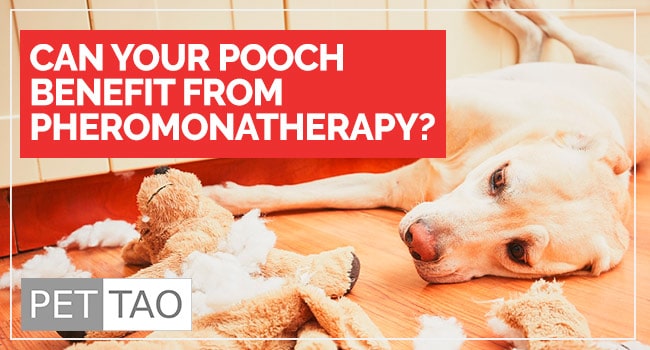He paces and whines and chews the furniture while you’re gone.
Maybe he even has accidents.
What are your options to relieve your pet’s anxiety?
Medication and behavioral training are two options, but they are not effective for all pets.
Many pet owners find success with pheromonatherapy to treat their pup’s anxiety.
How Can You Relieve Your Pet’s Anxiety?
Consult your veterinarian to ensure your pup isn’t experiencing underlying health issues.
Once your pet receives a clean bill of physical health, you can address emotional issues.
Pharmaceuticals
Veterinarians practicing Western medicine frequently turn to pharmaceuticals to treat dog anxiety.
Medications are effective at treating some forms of anxiety.
However, they sometimes cause serious side effects.
Alternative or Eastern veterinarians may recommend safer or gentler options.
Behavioral Training
Fearful pets are scared of an object, place, animal, person, or situation.
Reassociate your pet’s fears by introducing something positive in the presence of their stressor.
While behavioral training is effective for some pets, others benefit from different options.
For example, many rescue pets are unresponsive to behavioral training.
Abused dogs are often more fearful and anxious.
Anti-anxiety Clothing
Items such as the Thundershirt have become popular in recent years.
Anti-anxiety clothing consists of a tight-fitting, but comfortable garment the pet wears to make him feel secure.
Thundershirts alleviate anxiety in some barking dogs and those scared of thunder but do not treat all cases of anxiety.
Pheromonatherapy
Pheromonatherapy alleviates your pet’s anxiety safely.
The simple and cost-effective treatment uses pheromones to manage behavior.
Animals use pheromones to communicate with each other and themselves. For example, an animal will leave a scent behind to remember a nearby danger.
Pheromonatherapy uses pheromones to tell your pet the environment or situation is safe.
Pheromonatherapy is different from aromatherapy, which relies on odors. Pheromones are odorless but detectable to pets.
Why Pheromonatherapy?
Scientists have studied pheromonatherapy extensively.
Pheromonatherapy is scientifically proven
Researchers from the Animal Behaviour Cognition and Welfare Group at the University of Lincoln found pheromonatherapy successfully reduced anxiety in animals.
“We’ve been developing new applications (of pheromonatherapy), for example in dogs to reduce the stress of going into waiting rooms in veterinary practices; treating noise fears; and helping puppies settle into a new home,” Daniel S. Mills, professor, and researcher told the School of Life Sciences at the University of Lincoln.
Mills, Maya Braem Dube, and Helen Zulch wrote about the effect of stress on animals and how to use chemical signals to ease stress in Stress and Pheromonatherapy in Small Animal Clinical Behaviour.
The scientists presented the data at the World Small Animal Veterinary Congress in 1996.
Dr. Patrick Pageat, a French veterinarian, started the study of pheromones and animals.
Pageat concluded pheromones effectively treat dogs suffering from separation anxiety, noise phobias, and other situational fears. BSAVA Manual of Behavioural Medicine published Pageat’s work.
Pheromonatherapy safely treats your pet
Because pheromones are species-specific, they do not affect humans or other animals in the home.
Pets receive pheromonatherapy through a diffuser or collar lasting about one month.
Your pet will act naturally, not sleepy while receiving pheromonatherapy.
Gradually, your pet will feel more comfortable in situations.
Your vet may recommend behavior modification or medication.
Pheromonatherapy partners well with other treatment options.
Have you tried pheromonatherapy to ease your pet’s anxiety? Was it successful? Share your story below!








